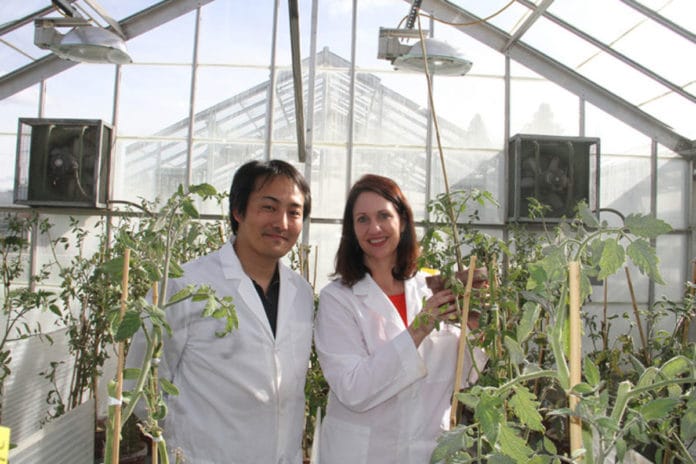The powder scab pathogen is a protist, from the same kingdom of life as slime molds and protozoa and is resistant to present day fungicides. It is major threat to potato plant which infects roots and tubers of its potato host and also damages tubers skin turning them ugly and unsellable.
The scab carries virus, potato mop-top virus, or PMTV which disrupts plant growth and causes tuber necrosis where edible potato dies from inside. Scary part is when you don’t know presence of scab until you dig up and cut into potatoes, it can infect whole field but doesn’t show up ground.
Helping to safeguard Northwest’s valuable potato crop from emerging threats, two scientists at WSU launching new research into better plant defenses based on genes and vaccine.
“Farmers struggle to control it, because fungicides don’t work very well,” said Tanaka, assistant professor and phonemics researcher with the WSU Department of Plant Pathology.
To fight powdery scab, Tanaka leads a three year project funded by a new $490,000 grant from AFRI and matching funds from consortium. He with assistance of Gleason is developing a biodegradable vaccine that can be delivered to the rhizosphere—the web of soil and living organisms in and around a plant’s roots.
“We can use bacteria as a courier and defender to vaccinate the plant against both the protist and the virus,” Tanaka said. “The bacteria occupies the space and changes the microbiome, so the pathogen can’t take hold. At the same time, the plant is protected by immunization.”
Above ground effects of their immunostimulant on plant growth and development with the help of new high throughput phenotyping technology will also be studied by Tanaka and Gleason at WSU. This technology will monitor effects of the defender bacteria on factors like photosynthesis and water use efficiency in potato seedlings and other plants.
While targeting another pest, Gleason, also an assistant professor of plant pathology, leads a three-year, $450,000 grant project funded by AFRI. She’s studying root-knot nematode, a parasite worm that starves plant by secreting protein into plant cells that trick their host into providing them with a safe feeding site and plentiful nutrients.
Above ground plant shows discolored leaves and when farmers dig for potatoes, they discover lumpy, misshapen tubers.
“I’m trying to unravel how it works and find a way to block it,” Gleason said. “Stop the molecular mechanism, and the root-knot nematode can’t create its feeding site. If it can’t feed, it starves, and the plant thrives.”
Similar to hers and Tanaka’s project, Gleason’s research are finding ways to help farmers with new and more sustainable tool for pest control.
“We’re trying to reduce reliance on chemicals using biological and genetic controls, preserving beneficial organisms while helping feed the world,” Gleason said. “It’s potentially a huge benefit for potatoes and other specialty crops, as well as human and environmental health.”
